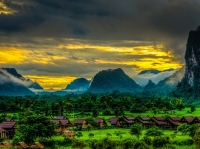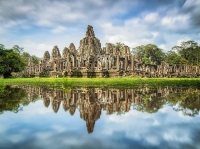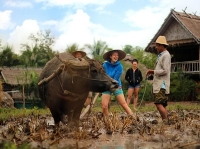History of Wat Sisaket
Wat Si Saket near Royal Palace was built from 1818 to 1824 by mandate of King Anouvong, the last King of Vientiane. Many meetings between the King and aristocracy were organized at this splendor temple. The wat was considered as a library because it consists of the manuscripts of palm leaves as well as books of Buddhist philosophy. Although a lot of ancient buildings in Vientiane were destroyed in the invasion of Siam in 1828, Wat Sisaket still maintains its original appearance and becomes the oldest temple in the capital. The French colonial government restored the temple in 1924 and 1930.
Highlights of Wat Sisaket
If having a visit to Sisaket early in the morning, travelers will watch a large number of local people going to pray, making merit and offering food to the monks. The entrance to Wat Sisaket is a large garden with benches surrounded by tropical fruit trees’ shade.
At the main entrance, there is a small 2-storey structure called the drum tower. An immense drum is placed in the upper floor.
The wonderful temple is a mixture of Lao and Thai style. The main building is called Sim by the locals or Ordination Hall. It includes a column which is 5 levels of roof in length and decorated with attractive wood carvings.
On one side of Ordination Hall is a wooden trough in the shape of a Naga snake. In Lao new year celebrations, the water flowing through the trough is used for cleaning of Buddha statues.
Ouside of the central architecture is a rectangular courtyard with colorful plants. Besides, at the courtyard galleries, visitors will find more than 6,000 Buddha images describing the different periods of the life of Buddha. The oldest items is from 16th century. The majority of images are hung on the walls of the wat and the bigger are arranged on various shelves. The Buddha statues here are mainly wood carvings, however, some of them are made of bronze, silver and ceramics.
Opening Hours and Price to Wat Sisaket
The temple welcomes tourists every day of the week, specifically from 8:00 to 12:00 in the morning and from 13:00 to 16:00 in the evening. The price of admission is 5,000 kips.














